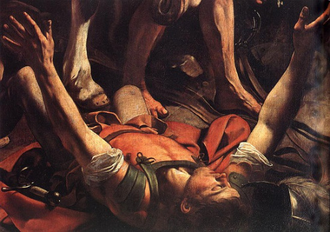Conversion of St Paul

Conversion of St Paul - Caravaggio Wiki image
Apostle of the Gentiles. This is one of the feast days celebrating the life of St Paul. Originally named Saul, he was born a Jew in Tarsus. He grew to hate Christians because he believed they were perverting the truth of his own faith.
Saul was present at the stoning of the first martyr, St Stephen. After the body was removed, Saul ravaged the church and went from house to house dragging out Christians and taking them to prison.
He was so angry about the Christians he asked for permission from the High Priest in Jerusalem to seize the Christians of Damascus and bring them to Jerusalem for punishment.
On the road to the city he was struck to the ground by a flash of light which blinded him. He heard a voice saying: "Saul Saul, why are you persecuting me?"
When he asked "Who are you Lord" the voice replied: "I am Jesus whom you are persecuting."
Jesus ordered him to continue on to Damascus and visit a Christian named Ananias. Saul found his way to the house. Ananias welcomed him and he learnt from the Christian community about their faith. As he received the truth about Christianity his sight returned. To symbolise his new life he took a new name: Paul, and began visiting the synagogues preaching that Jesus was the Son of God. There were threats against his life but his new Christian friends helped him escape by lowering him over the city walls in a basket at night.
From this time he began his mission of evangelisation. He travelled to Cyprus, Asia Minor and eastern Greece and then Ephesus, where he stayed a long time and wrote Corinthians I. From here he went to Macedonia and Achaia where he wrote Romans, before returning to Jerusalem. There he was attacked and beaten by a mob for preaching. Paul invoked his privileges as a Roman citizen and appealed to Caesar for a trial in Rome. On his voyage there he was shipwrecked on Malta and stayed there under house arrest for two years during which time he wrote his captivity Epistles.
According to tradition, St Paul was beheaded in Rome in AD 65, during the persecutions of Nero. He is said to have been martyred the same day as St Peter, on 29 June - which is another of his feast days.
St Paul was a tireless missionary and a powerful thinker. His writing is one of the major foundations of Christian theology.












